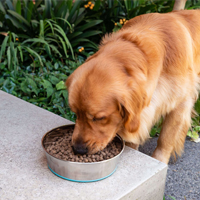
Introduction to Liver Disease In Dogs
Liver problems can develop for a lot of different reasons and it’s often a surprise when we find out that our companion is suffering with a liver problem.
Sadly, dogs today are suffering from liver and kidney failure like never before. It’s believed the use of chemical flea and tick products, OVER vaccination, lawn pesticides, the over use of synthetic prescription drugs and last but not least, poor diet choices are some of the major causes of the disease.
Why Would My Dog’s Liver Enzymes Be Elevated?
There are 5 different types of this disease that can affect your dog’s liver and cause the enzymes in his liver to sky rocket:
Infectious: According to PetMD, this is considered the most common viral form of liver disease which causes inflammation and scarring. Dogs become infected with Leptospirosis by drinking contaminated water. The disease can also be spread to humans. Your vet will diagnose Leptospirosis by conducting a blood test or tissue biopsy.
Toxicities: This form happens when your dog ingests something toxic such as a poisonous plant leaf, flower bulb, toxic mushrooms, rat poison, anti-freeze or the artificial sweetener known as Xylitol. Be extremely careful with anything you feed that may contain Xylitol. Be leery of peanut butter. Several brands contain this artificial sweetener which can be life threatening causing low blood sugar (hypoglycemia) and/or death. Toxins aren’t always ingested through your dog’s mouth though. Sadly many pet owners aren’t aware just how dangerous chemical flea and tick products are. They are toxic. No different than the poisons you put on your yard to kill the bugs. So every time you place one of these products on his body to get absorbed through the skin, the liver tries to fight off these poisons. Same goes with vaccines. Over vaccination is believed by many to be a very big cause of so much disease in dogs today.
Drug Induced: Certain synthetic drugs and medications are known to induce liver damage. Antibiotics such as tetracycline can cause liver damage. Pain medications are well known to cause liver damage as well and this is why it’s important to get routine blood work every three months if you have your dog on ANY medications from the vet. Any type of synthetic drug that your vet put’s your dog on long term should be followed up with routine blood work. Same goes if your dog is on and off a certain drug. Get that liver checked.
Congenital: This condition of liver disease in dogs is known as portal systemic shunt aka PSS. A liver shunt happens when there’s an abnormal connection between a a vein and a branch of a vein which allows the blood to shunt around the liver.Dogs with this form of liver disease develop abnormally high levels of ammonia in their blood. This can result in several neurological symptoms including seizures, head pressing, staggering and gait changes and behavioral changes. Signs include intermittent diarrhea and vomiting, possible polyuria and polydipsia. Head pressing, unconsciousness and dementia. Roughly 25 – 50% experience seizures.
Copper storage disease is another form falling under the congenital category which is known as Wilson Disease in people, happens when dogs are unable to appropriately process copper. The liver ends up with high concentrations of copper in the liver tissue, leading to liver damage. A biopsy is needed to diagnose if your dog is storing copper in his or her liver. Symptoms include diarrhea, vomiting, anorexia, lethargy, ascites, anemia and jaundice.
Tumors: When a cancerous tumor has spread from where it originally developed is called Metastatic disease. According to experts, this is much more common than a tumor originating in the liver itself, although it can happen. Causes of liver tumors include body toxins and/or parasites.
What The Liver Does
After skin, the liver is the largest organ with a huge job too!
It manufactures blood proteins, fats, proteins responsible for blood clotting, energy storage for the manufacturing of blood sugar as needed by the body, it stores fat soluble vitamins and iron, it detoxifies the body of drugs, chemicals and other useless substances; it’s responsible for the inactivation of hormones that the body no longer needs as well as the secretion of bile.
Plus, in order to prevent harmful bacteria from moving to other parts of the body, the liver filters the blood coming from the digestive tract.
It’s the liver that actually prepares all the toxins and waste in the body for elimination through the kidneys.
Common Testing For Liver Problems in Dogs
There are quite a few tests vets want to do when determining that your dog has a liver problem.
Blood tests are probably the most common diagnostic test which is used to check the dog’s blood including red and white blood cell levels and enzyme levels within the liver.
Alanine aminotransferase and alkaline phosphatase are liver enzymes that often appear elevated if your dog is suffering from liver disease. Veterinarians will usually want to do a bile acid test and a urinalysis as well.
Besides the above testing, most vets will want to get x-rays and an ultrasound as well. The x-rays will help your vet to actually identify any odd characteristics of the liver such as size whether unusually small or enlarged.
The ultrasound will allow your vet to actually examine the internal structure of the liver and help to figure out what liver condition he is actually dealing with.
In certain cases, a vet may recommend surgery in order to actually explore the liver hands on and gather a sample for a biopsy.
What You Feed is Vital to Your Dog’s Prognosis
Avoid Kibble and Canned Dog Foods
No matter what type of liver disease your dog has, what he eats and what he doesn’t eat from this point forward should be your biggest concern. See the links at the beginning of this article and read thru the information. Our cookbook includes recipes for liver disease (but not for dogs storing copper).
Avoid Using ANY Chemical Flea & Tick Products and Heart Worm Medications
Use Natural Products ONLY
Avoid using ANY chemical flea and tick treatments and heart worm medications. Use natural products only. We share lots of good information for controlling parasite problems on our page for naturally treating lyme disease in dogs.
If your dog has liver problems, please don’t ignore them. Your dog’s health can go from bad to worse VERY quickly!
See Our Other Articles Regarding Liver Disease in Dogs
Recipes for Dogs with Liver Disease
Dog Treat Recipes for Dogs with a Failing Liver











